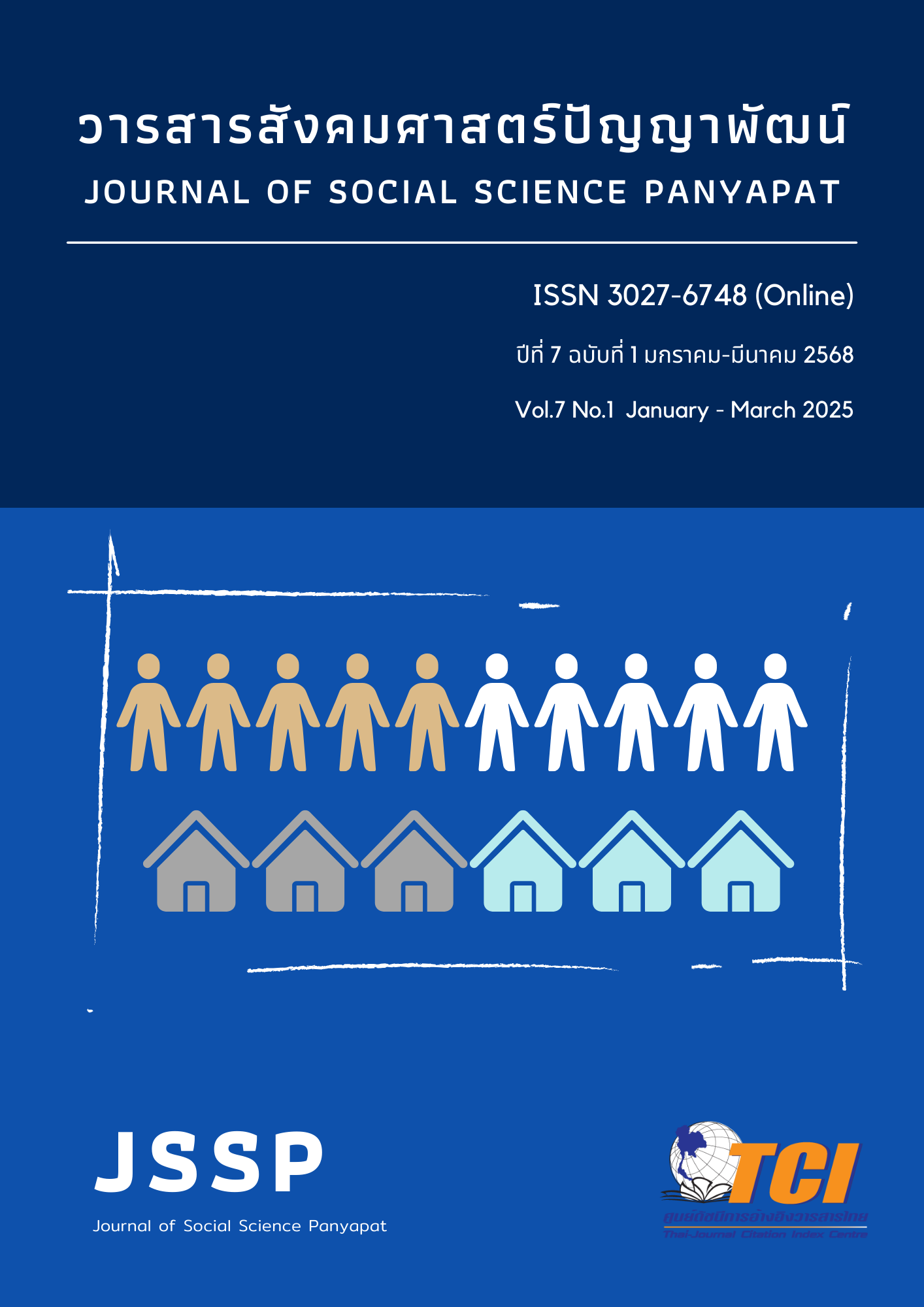ภาวะผู้นำแบบร่วมแรงร่วมใจที่ส่งผลต่อคุณภาพของสถานศึกษา สังกัดสำนักงานเขตพื้นที่การศึกษาประถมศึกษานครศรีธรรมราช เขต 3
คำสำคัญ:
ภาวะผู้นำ, ร่วมแรงร่วมใจ, คุณภาพการศึกษาบทคัดย่อ
การวิจัยครั้งนี้มีวัตถุประสงค์เพื่อศึกษา (1) ระดับของภาวะผู้นำแบบร่วมแรงร่วมใจของผู้บริหารสถานศึกษา (2) คุณภาพการศึกษาของสถานศึกษา (3) ภาวะผู้นำแบบร่วมแรงร่วมใจที่ส่งผลต่อคุณภาพการศึกษาของสถานศึกษา (4) แนวทางการพัฒนาภาวะผู้นำแบบร่วมแรงร่วมใจที่ส่งผลต่อคุณภาพของสถานศึกษา สังกัดสำนักงานเขตพื้นที่การศึกษาประถมศึกษานครศรีธรรมราช เขต 3 การวิจัยในครั้งนี้เป็นการวิจัยแบบผสมผสาน กลุ่มตัวอย่าง ได้แก่ ครูและบุคลากรทางการศึกษา ทั้งหมด 307 คน เครื่องมือที่ใช้เป็นแบบสอบถามเกี่ยวกับภาวะผู้นำแบบร่วมแรงร่วมใจและคุณภาพของสถานศึกษา สถิติที่ใช้ในการวิจัย ได้แก่ ค่าร้อยละ ค่าเฉลี่ย ส่วนเบี่ยงเบนมาตรฐาน ค่าสัมประสิทธิ์สหสัมพันธ์แบบเพียร์สันและการวิเคราะห์การถดถอยเชิงพหุคูณ ผลการศึกษาพบว่า 1) ภาวะผู้นำแบบร่วมแรงร่วมใจที่ส่งผลต่อคุณภาพการศึกษาของสถานศึกษา โดยรวมอยู่ในระดับมากที่สุด 2) คุณภาพการศึกษาของสถานศึกษา โดยรวมอยู่ในระดับมากที่สุด 3) ภาวะผู้นำแบบร่วมแรงร่วมใจของผู้บริหารสถานศึกษาส่งผลต่อคุณภาพการศึกษา ในภาพรวมและรายด้าน มีความสัมพันธ์กันอย่างมีนัยสำคัญทางสถิติที่ .01 โดยมีค่าความสัมพันธ์ทางบวกโดยมีค่าความสัมพันธ์ในระดับเชิงบวกในระดับสูง เท่ากับ .895 และ 4) แนวทางการพัฒนาภาวะผู้นำแบบร่วมแรงร่วมใจของผู้บริหารสถานศึกษาที่ส่งผลต่อคุณภาพการศึกษาของสถานศึกษา พบว่า (1) บริหารแบบร่วมแรงร่วมใจ เพื่อสอดคล้องกับหลักธรรมาภิบาล (2) กำหนดวิสัยทัศน์และเป้าหมายร่วมกัน ระหว่างผู้บริหาร คณะครู และบุคลากร พร้อมพัฒนาตนเองอย่างต่อเนื่อง (3) สนับสนุนการบริหารจัดการโรงเรียน ให้เป็นแหล่งเรียนรู้ พร้อมกำกับติดตามและประเมินผล (4) ปรึกษาหารือร่วมกัน เพื่อพัฒนาการปฏิบัติงาน (5) ส่งเสริมการพัฒนาครูและสร้างขวัญกำลังใจ ให้บุคลากรอย่างเหมาะสม และ (6) เชื่อมั่นในความสามารถของผู้ใต้บังคับบัญชา ในการนำองค์กรบรรลุเป้าหมาย
เอกสารอ้างอิง
เกศศิรินทร์ มหรรณพ. (2565). ภาวะผู้นำแบบร่วมมือรวมพลังของผู้บริหารที่ส่งผลต่อคุณภาพการจัดการศึกษาของสถานศึกษาสังกัดสำนักงานเขตพื้นที่การศึกษามัธยมศึกษา เขต 12. (ครุศาสตรมหาบัณฑิต, มหาวิทยาลัยราชภัฏนครศรีธรรมราช).
บุญไช จันทร์ศรีนา, วราภรณ์ ไทยมา และ วัยวุฑฒ์ อยู่ในศีล. (2562). การศึกษาภาวะผู้นำแบบร่วมมือรวมพลังของผู้บริหารสถานศึกษาที่ส่งผลต่อการดำเนินงานของสถานศึกษาขั้นพื้นฐานของภาครัฐ สังกัดกระทรวงศึกษาธิการและกีฬา สาธารณรัฐประชาธิปไตยประชาชนลาว. วารสารมนุษยสังคมสาร,17(1), 213-233.
ประภาพร สำเรียงจิต. (2558). การพัฒนาโปรแกรมเสริมสร้างภาวะผู้นำแบบรวมพลังของผู้บริหารโรงเรียนประถมศึกษา สังกัดสำนักงานคณะกรรมการการศึกษาขั้นพื้นฐาน. (การศึกษาดุษฎีบัณฑิต, มหาวิทยาลัยมหาสารคาม).
สำนักงานเขตพื้นที่การศึกษาประถมศึกษา นครศรีธรรมราช เขต 3. (2566). แผนพัฒนาการศึกษาขั้นพื้นฐาน พ.ศ. 2566-2570. นครศรีธรรมราช: สำนักงานเขตพื้นที่การศึกษานครศรีธรรมราช เขต 3.
สำนักงานเลขาธิการสภาการศึกษา. (2560). แผนการศึกษาแห่งชาติ พ.ศ. 2560 – 2579. กรุงเทพฯ: พริกหวานกราฟฟิค จำกัด.
Cronbach, L. J. (1970). Essentials of psychological test. (5th Ed.). New York: Harper Collins.
Krejcie, R. V. & Morgan, D. W. (1970). Determining Sample Size for Research Activities. Educational and Psychological Measurement, 30(3), 607–610.
Pena, D. C. (2000). Parent involvement: Influencing factors and implications. The Journal of Educational Research, 94(1), 42-54.
Telfotd, H. (1996). Transforming Schools through Collaborative Leadership. London: Falmer Press.
ดาวน์โหลด
เผยแพร่แล้ว
รูปแบบการอ้างอิง
ฉบับ
ประเภทบทความ
สัญญาอนุญาต
ลิขสิทธิ์ (c) 2025 วารสารสังคมศาสตร์ปัญญาพัฒน์

อนุญาตภายใต้เงื่อนไข Creative Commons Attribution-NonCommercial-NoDerivatives 4.0 International License.


